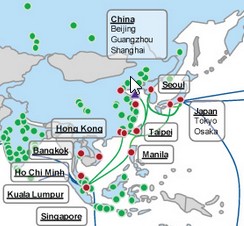The Asia-Pacific regional carrier Pacnet is further extending itself into Mainland China. They have won an enhanced value-added service license from China’s Ministry of Industry and information Technology that expands their IP VPN coverage area from a mere 20 cities to a much wider scope of 23 provinces. Two weeks ago, Pacnet announced a substantial restructuring, affecting as much as 30% of the company’s employees. Expanding in China was one of the areas on which they intended to increase their focus.
Pacnet’s IP VPN services will be available in the four cities that are provinces in and of themselves (Beijing, Tianjin, Shanghai, and Chongqing), the eighteen provinces that constitute most of the country’s economy, plus the Inner Mongolia Autonomous Region. Still missing are the provinces of China’s interior: Guizhou, Qinghai, Gansu, Yunnan, and the other autonomous regions (Tibet, Xinjiang, Ninxia Hi, Guangxi Zhuang). Some of those are obscure and not economically important, or obviously politically sensitive.
The Chinese footprint is one of Pacnet’s main differentiators. The company’s wholesale subsea bandwidth offerings have seen much greater competition over the past few years with so much new capacity coming online across the region. Thus the terrestrial assets their cables hook up are of greater importance, and few global network operators go beyond a major node in Hong Kong and perhaps an ancillary one in Beijing or Shanghai. Pacnet’s Chinese presence is a Sino-foreign joint venture, and the first such company to receive a license to go this deep.
Pacnet’s private equity owners have been looking for an exit, with the most recent rumors earlier this summer being a purchase by Indonesia’s PT Telkom. That rumor fell through shortly after Bill Barney was unceremoniously removed as CEO back in June, after which the company seems to have shifted gears. But before PT Telkom, there was actually interest from China Telecom in buying Pacnet a few years back although obviously nothing came of it. Pacnet’s ability to straddle the border could be one of its key selling points going forward, offering both Chinese operators a way to greater influence in the Pacific theatre and foreign firms a much easier entry into the mainland market.
If you haven't already, please take our Reader Survey! Just 3 questions to help us better understand who is reading Telecom Ramblings so we can serve you better!
Categories: Internet Backbones · Undersea cables






Discuss this Post